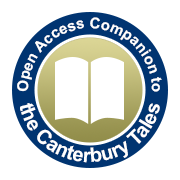Welcome to the Open Access Companion to the Canterbury Tales
The Open Access Companion to the Canterbury Tales (OACCT) is a volume of introductory chapters for first-time, university-level readers of Geoffrey Chaucer’s The Canterbury Tales. The chapters have been created and edited by professional scholars of Chaucer, and all material is released open access and free of charge for classroom, scholarly, and personal use.
There are two kinds of material available here. Essay chapters explore each of the tales in relation to an engaging topic of broad general interest, while reference chapters provide key context and tools for understanding the Canterbury Tales and its time period. In the future, more material will be added to this project: teaching resources, reader contributions, and new essay chapters that consider tales from additional viewpoints and in relation to different topics.
A site menu is located at the bottom of every page for easy navigation. To return to this page you can click on the title at the top of each page. New readers may wish to start with our User’s Guide for ideas about how to read, use, and get the most out of this resource.
List of Chapters and Topics
Essay Chapters
The General Prologue: Cultural Crossings, Collaborations, and Conflicts
Sisterhood and Brotherhood in the Knight’s Tale
Suffering Bodies in the Knight’s Tale
Protest, Complaint, and Uprising in the Miller’s Tale
Wages, Work, Wealth, and Economic Inequality in the Reeve’s Tale
Jokes, Jests, Pranks, and Play in the Cook’s Tale
Race and Racism in the Man of Law’s Tale
Love and Marriage in the Wife of Bath’s Prologue
Rape and Justice in the Wife of Bath’s Tale
The Friar’s Tale: Animals and the Question of Human Agency
Gender and Sexual Identities in the Summoner’s Prologue and Tale
Authority (Familial, Political, Written) in the Clerk’s Tale
Sexuality, Obscenity, and Genre in the Merchant’s Tale: The Case of Fabliau
Environment, Landscape, and Nature in the Merchant’s Tale
Subsistence (Land and Food) in the Squire’s Tale
Emotion, Feeling, Intensity, Pleasure, and the Franklin’s Tale
Children, Violence, and Ethics in the Physician’s Tale
The Body and Its Politics in the Pardoner’s Tale
The Shipman’s Tale: Deciphering, Coding, and Confusion
The Prioress’s Tale: Relating to the Past, Imagining the Past, Using the Past
Imagining the World in Maps and Stories: Sir Thopas
The Tale of Melibee: Local Government, Power, Lordship, and Resources
The Monk’s Tale: Disability/Ability
The Nun’s Priest’s Tale: Entertainment versus Education
The Second Nun’s Tale: Language Politics and Translation
The Canon Yeoman’s Tale: Invention, Discovery, Problem-Solving, and Innovation
Feminism and Women’s Experience in the Manciple’s Tale
The Parson’s Tale: Religious Devotion and Spiritual Feeling
Religious Debate and Polemic in the Retraction
Two Kinds of Anxiety in the Canterbury Tales: A Study of the Host and Framing Narrative
Reference Chapters
Everyday Life in Late Medieval England
English Society c. 1340-1400: Reform and Resistance
Manuscripts of the Canterbury Tales
What Does It Mean to Read a Medieval Text?
The OACCT was conceived, planned, and edited over 2015-2017 by Candace Barrington, Brantley L. Bryant, Richard H. Godden, Daniel T. Kline, and Myra Seaman.
The OACCT as a whole is licensed with a Creative Commons CC-BY-NC license. Individual chapters are licensed with a Creative Commons CC-BY-NC-ND license.
Contact Information:
To contact the project, please email:
opencanterburytales AT gmail dot com
Keep up with the OACCT on facebook
https://www.facebook.com/OACCT/

This work is licensed under a Creative Commons Attribution-NonCommercial 4.0 International License.
